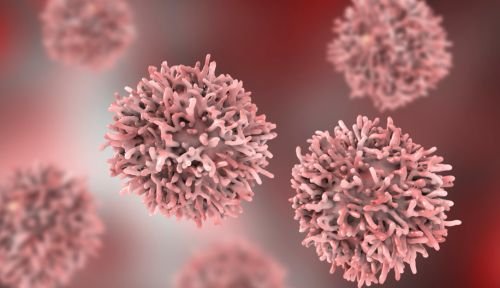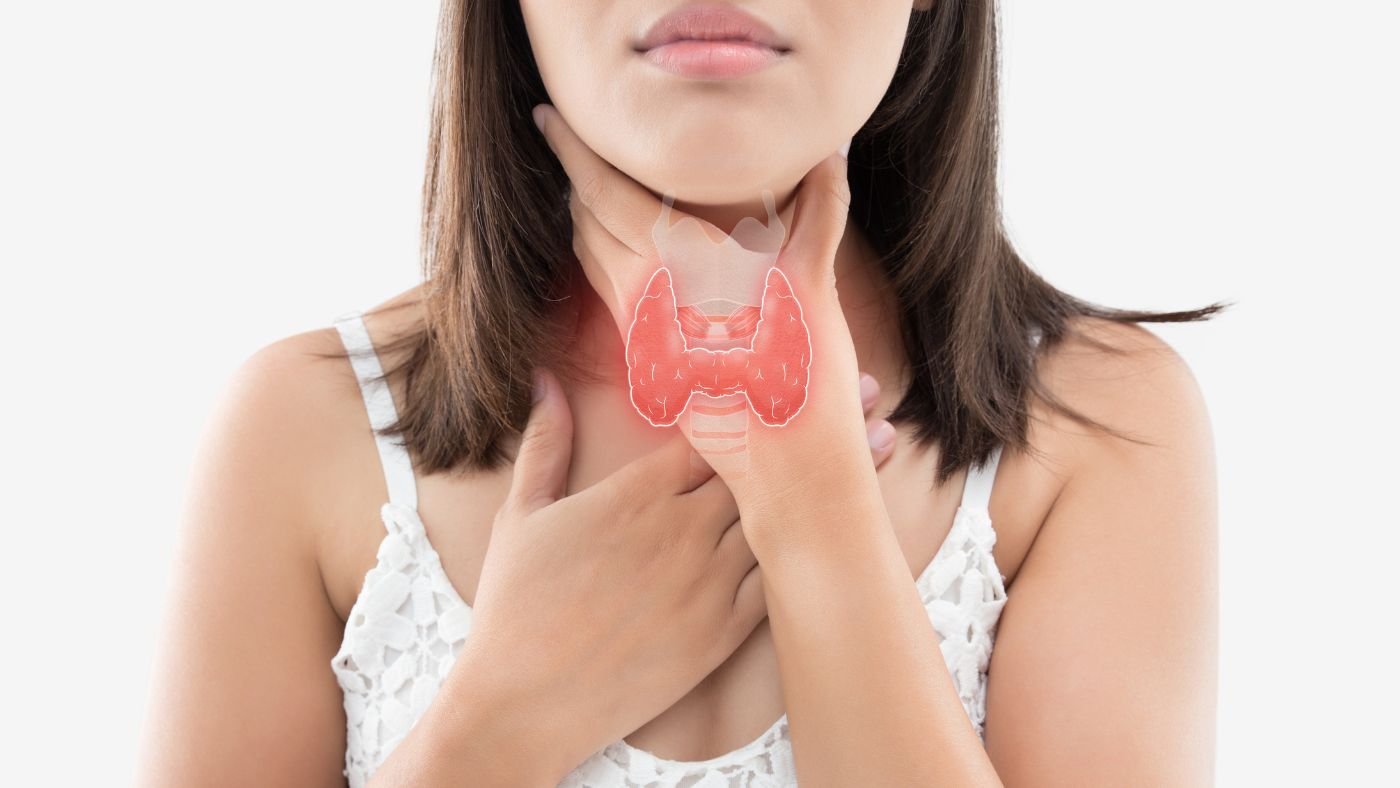The thyroid gland is a small but important organ located at the front of the neck. It is responsible for the production of thyroid hormones, which are vital for the functioning of our body. They regulate our metabolism, heart rate, body temperature and even thinking. At the same time, the thyroid gland is very vulnerable and often suffers from various disorders that cause thyroid symptoms.
Thyroid disorders can be related to too much or too little thyroid hormone. Too much hormone can cause hyperthyroidism, and too little can cause hypothyroidism. Both conditions can cause various thyroid symptoms, such as weight loss or weight gain, fatigue, depression, skin and hair changes, feeling cold or hot.
Thyroid symptoms can be very diverse and often confused with symptoms of other diseases. Therefore, it is important to know how to recognize thyroid symptoms and when to see a doctor.
Understanding thyroid hormones and their levels
The thyroid gland produces two main hormones, triiodothyronine (T3) and thyroxine (T4). These hormones are responsible for many functions in our body. They regulate our metabolism, heart rate, body temperature and even thinking. Thyroid hormone levels are very important to our health.
Thyroid hormone levels in the blood can fluctuate for a variety of reasons. For example, it can increase due to stress, infections, pregnancy or the use of certain medications. On the other hand, thyroid hormone levels can decrease due to thyroid disorders, chronic fatigue syndrome, depression, or the use of certain medications.
Hyperthyroidism is a condition where the thyroid gland produces too many hormones. This can cause symptoms such as weight loss, palpitations, anxiety, irritability, sweating and feeling hot. Hypothyroidism is a condition where the thyroid gland produces too few hormones. This can cause symptoms such as weight gain, fatigue, depression, chills, dry skin and hair loss.

Interesting facts about the thyroid gland
The thyroid gland is one of the smallest organs in our body, but it plays a very important role in our health. Here are some interesting facts about the thyroid gland that you may not have known.
First of all, the thyroid gland is the only organ that uses iodine. It is needed for the production of thyroid hormones. Without sufficient iodine in our diet, the thyroid gland cannot produce enough hormones.
Second, the thyroid gland can go up and down. When it produces too many hormones, it can become enlarged, causing a condition called a goitre. On the other hand, if it produces too few hormones, it can decrease.
Finally, thyroid disorders are much more common in women than in men. This may be related to the hormonal fluctuations that occur in women's bodies during menstruation, pregnancy and menopause.
Common thyroid disorders
Thyroid disorders are very common. They can occur for a variety of reasons, including genetics, diet, stress, and the use of certain medications. The most common thyroid disorders are hyperthyroidism, hypothyroidism, inflammation of the thyroid gland, and thyroid nodules.
Hyperthyroidism is a condition where the thyroid gland produces too many hormones. This can cause symptoms such as weight loss, palpitations, anxiety, irritability, sweating and a feeling of heat.
Hypothyroidism is a condition where the thyroid gland produces too few hormones. This can cause symptoms such as weight gain, fatigue, depression, chills, dry skin and hair loss.
Inflammation of the thyroid gland, also called thyroiditis, can cause symptoms of hyperthyroidism or hypothyroidism. It can also cause neck pain and swelling. Thyroid nodules are small, usually harmless lumps of tissue in the thyroid gland. Most nodules are harmless, but some may be cancerous.

Recognizing thyroid symptoms
Thyroid symptoms can be very diverse and often confused with symptoms of other diseases. Therefore, it is important to know how to recognize thyroid symptoms and when to see a doctor.
Thyroid symptoms can include weight changes, fatigue, depression, skin and hair changes, feeling cold or hot, changes in heart rate, menstrual changes in women, muscle and joint pain, poor concentration and memory, hoarseness or difficulty swallowing.
If you have any of these symptoms, it is important to see your doctor. He can perform a thyroid hormone test to determine if your thyroid is working properly. He may also perform an ultrasound of the neck to check for thyroid nodules or other abnormalities.
Special cases: Thyroid symptoms in women
Thyroid disorders are much more common in women than in men. This may be related to the hormonal fluctuations that occur in women's bodies during menstruation, pregnancy and menopause. In addition, women are more likely than men to have autoimmune disorders that can affect the thyroid gland.
Thyroid symptoms in women can include weight changes, fatigue, depression, skin and hair changes, feeling cold or hot, heart rate changes, and menstrual changes. In addition, women may experience infertility, pregnancy complications, and too much or too little weight gain during pregnancy.
If you have any of these symptoms, it is important to see your doctor. He can perform a thyroid hormone test to determine if your thyroid is working properly. He may also perform an ultrasound of the neck to check for thyroid nodules or other abnormalities.

What are thyroid nodules and how can they affect your health?
Thyroid nodules are small, usually harmless lumps of tissue in the thyroid gland. Most nodules are harmless, but some may be cancerous.
Thyroid nodules may be too large and cause neck swelling or difficulty swallowing. In addition, they can cause changes in thyroid hormone production and lead to symptoms of hyperthyroidism, such as weight loss, palpitations, anxiety, irritability, sweating, and hot flashes.
If you have thyroid nodules, it is important to see your doctor. He may perform an ultrasound of the neck to check the size and structure of the nodule. He or she may also perform a biopsy of the nodule to determine if the nodule is cancerous.
Inflammation of the thyroid gland: causes and symptoms
Inflammation (swelling) of the thyroid gland, also called thyroiditis. It can be caused by an infection, an autoimmune disease, radiation therapy, or the use of certain medications.
Inflammation of the thyroid gland can cause abnormally high blood levels of thyroid hormones in hyperthyroidism or low hypothyroidism. It can also cause neck pain and swelling. Some people may experience fever, headache and sore throat.
If you have any of these symptoms, it is important to see your doctor. He can perform a thyroid hormone test to determine if your thyroid is working properly. In addition, he can perform an ultrasound examination of the neck.

Thyroid problems and related diseases
Thyroid problems can cause or be associated with other diseases. For example, hyperthyroidism can cause osteoporosis, heart rhythm problems, and eye problems. Hypothyroidism can cause high cholesterol, depression and infertility.
Some people may have a genetic predisposition to thyroid problems. In addition, certain diseases, such as type 1 diabetes and rheumatoid arthritis, can increase the risk of thyroid problems.
If you have thyroid problems, it's important to see your doctor. He can perform a thyroid hormone test to determine if your thyroid is working properly.
Thyroid Supplements: Benefits, Safety, and Tips
Thyroid supplements are quite popular among people who want to improve their thyroid health, but are they really effective and safe? We will discuss various thyroid supplements, their benefits, safety and recommendations for use.
List of the most effective thyroid supplements:
Zinc
Zinc is an important micronutrient required for thyroid function. Zinc plays an important role in thyroid hormone synthesis and metabolism.
Too much zinc for a long time can cause symptoms of indigestion, reduce copper amount in the body or reduce immunity.
Food sources of zinc:
- Oysters
- Red meat
- Poultry
- Seafood such as crabs and lobsters
-
KIKI Health ionic Zinc, liquid concentrate, 50ml29,90 €Rated 5.00 out of 5 based on 1 customer rating
Iron
Iron deficiency anemia can cause hypothyroidism.
However, too much iron can cause toxicity, reduce zinc absorption, and interact with medications.
Iron tablets and multivitamins that contain iron can affect the body's ability to absorb thyroxine. Some people with hypothyroidism, goiters, or thyroid cancer may need to take thyroxine medication. Therefore, some doctors recommend waiting a few hours after taking thyroxine before taking an iron supplement.
Food sources of iron:
- Lean meat
- Benign sea creatures
- Poultry
- Fortified breakfast cereal
- White beans
- Lenses
- Spinach
- Kidney beans
- Peas
Vitamin A
Vitamin A regulates thyroid hormone metabolism and inhibits thyroid-stimulating hormone (TSH).
in 2017 the review emphasizes that vitamin A plays an essential role in thyroid function. For example, vitamin A deficiency can worsen thyroid disorders caused by iodine deficiency. Retinoids, a form of vitamin A, can negatively affect iodine metabolism.
However, researchers say more studies are needed to confirm the benefits of vitamin A in the treatment of thyroid disorders.
Food sources of vitamin A:
- Beef liver
- Salmon
- Green leafy vegetables
- Dairy products
Supplements for Graves' Disease
Graves' disease is an autoimmune disease that causes hyperthyroidism. If Graves' disease is not treated by a doctor, it can cause serious health problems with the heart, muscles and bones and affect the baby during pregnancy.
- Selenium: Selenium supplementation may improve the effect of some thyroid medications and promote thyroid health in people with Graves' disease. A person could talk to their doctor about a 6-month trial period of selenium.
- Vitamin D: People with Graves' disease may be more prone to vitamin D deficiency, so supplementation or eating vitamin D-rich foods could help compensate for this deficiency. More research is needed to confirm other benefits of vitamin D for Graves' disease.
- Vitamin B12: People with Graves' disease may have higher vitamin B12 risk of shortage. Vitamin B12 deficiency symptoms may be masked by symptoms of thyroid dysfunction. A person should discuss vitamin B12 supplementation or dietary diversification with their physician.
Supplements for thyroid cancer
Thyroid cancer is fifth most often most common cancer in women in the United States. However, it is still unclear nutrition and the effect of supplements on this disease.
in 2020 In the review, researchers looked at the relationship between thyroid cancer, dietary factors, and eating habits.
The authors concluded that correcting for iodine deficiency may make thyroid cancer subgroups less aggressive without changing overall cancer risk.
In addition, they noted that the clinical utility of selenium and vitamin D supplementation is still unclear.
How to choose supplements safely
People with thyroid disorders should consult a health care professional to make sure supplements are safe for them. Some supplements may interact with medications a person is taking or be unsafe to take before surgery or chemotherapy.
Food and Drug Administration (FDA) does not regulate the safety and efficacy of dietary supplements, but it has established good manufacturing practices for supplement manufacturers. In addition, people can look for quality assurance marks from independent organizations.
Importance of thyroid test norms
Thyroid test levels are very important because they help your doctor determine if your thyroid is working properly. The thyroid gland produces two main hormones, thyroxine (T4) and triiodothyronine (T3), which help regulate the body's metabolism. In addition, thyroid-stimulating hormone (TSH) is secreted by the pituitary gland and regulates the production of thyroid hormones.
Thyroid hormone levels can vary depending on a person's age, gender, and health status. Normal T4 levels are between 4.5 and 11.2 micrograms per deciliter, and T3 levels are between 100 and 200 nanograms per deciliter. TSH levels are usually between 0.4 and 4.0 million units per liter.
If your thyroid hormone levels are too high or too low, it can indicate thyroid problems. For example, a high TSH level may indicate hypothyroidism, while a low TSH level may indicate hyperthyroidism. It is also important to pay attention to other thyroid symptoms, as each person can react to thyroid problems differently.

How to manage and treat thyroid disorders
Management and treatment of thyroid symptoms depends on the type of thyroid problem you have. Depending on your thyroid symptoms, treatment may include medication, surgery, radioiodine therapy, or hormone replacement therapy.
Treatment for hyperthyroidism usually involves drugs that reduce thyroid hormone production, radioiodine therapy, which destroys thyroid cells and reduces hormone production, or surgery to remove part of the thyroid gland. Treatment for hypothyroidism usually involves hormone replacement therapy, which uses artificial thyroid hormones.
Managing thyroid symptoms can also include lifestyle changes, such as a healthy diet, regular physical activity, and stress management. It is important to remember that thyroid symptoms can be chronic and require ongoing treatment and care.
Frequently asked questions about the thyroid gland
What is the thyroid gland?
The thyroid gland is a small, butterfly-shaped gland located in the throat, just below the Adam's apple. It produces hormones that regulate many body functions, including metabolism, heat production, and blood pressure.
What are the symptoms of thyroid?
Thyroid symptoms can be very varied, as this organ regulates many functions in the body. When the thyroid gland is overactive (hyperthyroidism), symptoms such as weight loss, increased appetite, anxiety, irritability, palpitations, increased sweating, weakness in patterns, and tremors may occur. When the thyroid gland is too weak (hypothyroidism), symptoms such as weight gain, fatigue, depression, dry skin, hair loss, and coldness may occur.
How is a thyroid condition diagnosed?
Thyroid conditions are usually diagnosed through blood tests that measure thyroid hormone levels. Other tests, such as an ultrasound or radioactive iodine absorption test, may sometimes be done.
What are the normal thyroid levels?
Thyroid levels are laboratory test results that show whether the thyroid gland is working properly. The main tests are measurements of TSH (thyroid-stimulating hormone), FT4 (free thyroxine) and FT3 (free triiodothyronine) levels in the blood. Norms may vary slightly depending on the laboratory, but generally TSH is between 0.4 and 4.0 mIU/L, FT4 is between 9.0 and 25.0 pmol/L, and FT3 is between 2.6 and 5.7 pmol/L.
How are thyroid disorders treated?
Treatment for thyroid disorders depends on the type of disorder. Hypothyroidism is usually treated with hormone replacement therapy, while hyperthyroidism can be treated with medication, radioactive iodine, or surgery.
Can thyroid disorders be prevented?
Although some thyroid disorders may be genetic and cannot be prevented, a healthy lifestyle, including a balanced diet and regular physical activity, can help maintain thyroid health.
Conclusions: The importance of monitoring thyroid health
The thyroid gland is a very important organ that regulates many functions in the body. Thyroid symptoms can have a big impact on your quality of life, so it's important to monitor your thyroid health.
Monitoring thyroid health involves regular tests to detect changes in thyroid hormone balance. Also, it is important to pay attention to your thyroid symptoms, especially if they are new or have changed. If you are experiencing any thyroid symptoms, you should see your doctor so that the cause of your thyroid problems can be determined and treatment can begin as soon as possible.
Monitoring thyroid health also includes maintaining a healthy lifestyle, including eating a healthy diet, exercising regularly, and managing stress. A healthy lifestyle can help keep your thyroid hormones in balance and reduce your risk of thyroid symptoms.
Ultimately, thyroid symptoms are very individual and may require an individualized treatment plan. It's important to work with your doctor to find the best way to manage your thyroid symptoms and maintain your thyroid health.












